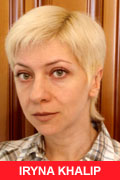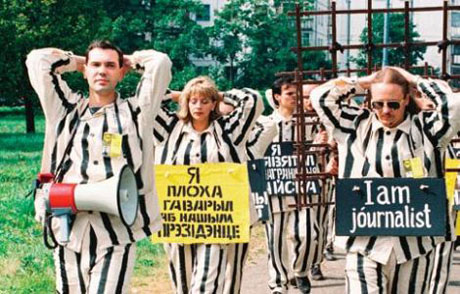Iryna Khalip: “Once you have been beaten, you become a fighter”
35- 19.10.2009, 16:21

The prestigious Courage in Journalism Award of the International Women’s Media Foundation (IWMF) will be granted to famous Belarusian journalist Iryna Khalip in New York on October 20.
Iryna Khalip won the award together with Cameroonian reporter Agnes Taile and journalist from Iran Jila Baniyaghoob.
“These remarkable journalists have chosen to report the news in three countries where pursuit of the truth puts them at risk for arrest, physical attacks and even death,” said Judy Woodruff, chair of the IWMF Courage in Journalism Awards. “Still, they have consistently, for many years, chosen to risk their lives and livelihoods in pursuing stories that illuminate the lives of people in their countries and enlighten us all.”
The IWMF’s press release says about Iryna Khalip:
 “Iryna Khalip, a reporter and editor in the Minsk bureau of Novaya Gazeta, has been a journalist for more than 15 years in Belarus, one of the most oppressive countries toward journalists in the world. After working at a succession of newspapers, only to see them closed by the government, she now works for one of the most independent newspapers in the former Soviet Union.
“Iryna Khalip, a reporter and editor in the Minsk bureau of Novaya Gazeta, has been a journalist for more than 15 years in Belarus, one of the most oppressive countries toward journalists in the world. After working at a succession of newspapers, only to see them closed by the government, she now works for one of the most independent newspapers in the former Soviet Union.
Anna Politkovskaya, a Russian journalist who received a 2002 IWMF Courage in Journalism Award, worked for the same newspaper. Politkovskaya was murdered for her work in 2006.
Khalip, 41, has been a journalist in Belarus for more than 15 years. She is frequently detained and subjected to all-night interrogations by police. She has been arrested and beaten by police, who keep her under constant surveillance.
In 2003, Khalip’s articles on corruption in the prosecutor's office caused the newspaper she was working for – Belaruskaya Delovaya Gazeta (Belarusian Business Newspaper) – to be suspended for “insulting the honor and dignity of the president.” The newspaper was forced to close permanently in 2006.
Khalip was among 35 journalists detained in connection with a demonstration held in Minsk in March 2000. The event was a protest against the official ban on a march that was to have been part of opposition festivities commemorating the 1918 founding of the Belarusian National Republic. Khalip was forced into a police vehicle and taken to an Interior Ministry facility in Minsk. She was released later that day.
The Belarusian government issued a warning to the independent newspaper Imya (Name) in 1999 for an article written by Khalip about the Central Electoral Committee’s activities. The newspaper’s coverage of the coming presidential elections amounted to inciting the overthrow of the state, said the chair of the Belarusian Press Committee. According to Belarusian press law, a second warning would lead to its closure.
Also in 1999, police came to Khalip’s home and detained her for an entire day, interrogating and threatening her. They took the computer she used for work. While Khalip was in detention, police searched her apartment and confiscated her travel documents.
While reporting at a 1997 rally opposing unification with Russia, Khalip was clubbed by riot police and dragged by her hair. Her father, who was at the rally with Khalip, was beaten unconscious.
Asked to define courage, Khalip said, “I believe that courage is sort of a state of mind: When a person does fear but continues to do whatever he or she is doing because the motivation is stronger.
“About 10 years ago, I think I did some courageous things. I did feel the fear,” she said. “But today it’s a matter of habit, to live in conditions of underground struggle, especially when I bear in mind that my husband, Andrei Sannikov, is an opposition leader.” This means that the two face double scrutiny from the government.
She wants to let reporters in democratic societies know that “a journalist who lives under a totalitarian regime cannot be objective. Objectivity is a privilege of a democratic society. Once you have been beaten, you become an activist, you become a fighter.”
She now takes steps to protect herself. “I follow the principle of glasnost – of security,” she said. After her office was ransacked and her computer and notes were confiscated, “I found myself completely helpless.”
Now, she says, “I try not to keep at home any kind of notes on my voice recorder. …I also work very quickly: I find out information and I publish it.”
Anna Politkovskaya’s murder made her rethink how she looked at death threats.
“I had thought that if they made threats, they’d never kill that person. They usually kill without warning. But there were threats against Anna, and she died. So obviously my logic was wrong,” Khalip said.
Now, she says, “if there is a threat against your life, you need first and foremost to call all your friends and tell them...Before Anna’s death, I didn’t take it very seriously. Now that this has happened, I realize they may really kill you.”
Created in 1990, the IWMF Courage in Journalism Awards honor women journalists who have shown extraordinary strength of character and integrity while reporting the news under dangerous or difficult circumstances. Including this year’s award winners, 66 journalists have won Courage Awards and 18 journalists have been honored with Lifetime Achievement Awards.
The 2009 awards will be presented at ceremonies in New York on October 20 and in Los Angeles on October 28.
Founded in 1990, the International Women’s Media Foundation is a vibrant global network dedicated to strengthening the role of women in the news media worldwide as a means to further freedom of the press. The IWMF network includes women and men in the media in more than 130 countries worldwide.










